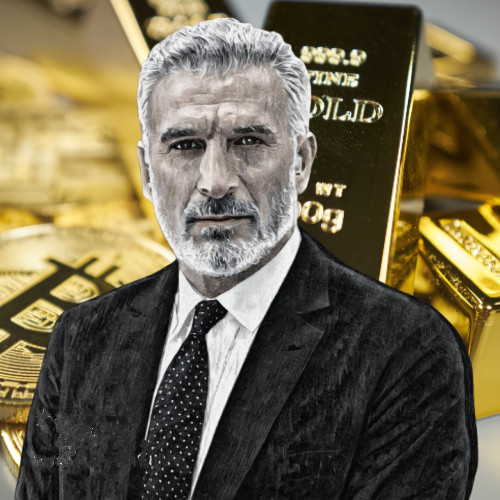In the volatile world of finance, where Bitcoin has surged from obscurity to fame, few figures have been as vocal or polarizing in their criticisms of cryptocurrency as Peter Schiff. Known for his straightforward, often scathing remarks on Bitcoin, Schiff has emerged as a well-recognized contrarian voice in the financial world, especially among crypto enthusiasts. Schiff’s strong stance against Bitcoin isn’t just opinion; it’s grounded in a distinct economic philosophy and years of market experience. So, who is Peter Schiff, and why does he see Bitcoin not as digital gold but as a ticking time bomb? Let’s explore.
Peter Schiff: The Man and His Career
Peter Schiff is not your average critic. He’s a respected stockbroker, financial commentator, and the CEO of Euro Pacific Capital, a brokerage firm he founded focusing on global investments and precious metals. Schiff is also known for accurately predicting the 2008 financial crisis, which established his credibility and boosted his reputation in financial circles. His predictions were based on keen observations about housing market flaws, excessive borrowing, and unsustainable consumer spending. Schiff’s prediction set him apart as a forecaster willing to go against the grain. It’s a trait that has carried over to his views on Bitcoin and cryptocurrencies.
A Traditionalist Economic Philosophy Rooted in Gold
Schiff’s skepticism of Bitcoin isn’t random; it stems from his broader economic philosophy rooted in traditional views on tangible assets. A staunch advocate of gold, Schiff believes in hard assets with intrinsic value and a proven track record as stores of wealth. For him, gold has stood the test of time for thousands of years, surviving economic upheavals and currency devaluations. Schiff is equally critical of fiat currencies. He views them as inherently flawed due to their susceptibility to inflation and central bank manipulation. His criticism of Bitcoin, therefore, is part of his broader view that money should be backed by a stable, tangible asset, not speculation or complex algorithms.
Bitcoin in the Crosshairs: Schiff’s Key Criticisms
Schiff has a long list of concerns about Bitcoin, which he frequently describes as the “digital equivalent of fool’s gold.” First and foremost, he argues that Bitcoin’s volatility makes it a poor store of value. While Bitcoin’s price may rise dramatically, it also frequently plunges, often losing significant value within days. Schiff believes this instability undermines Bitcoin’s utility as a stable currency.
Another core issue for Schiff is Bitcoin’s lack of intrinsic value. Unlike gold, which can be used in industries like jewelry and electronics, #Bitcoin has no physical form or alternative use. Schiff compares Bitcoin to historical speculative bubbles, notably the 17th-century tulip mania, where a frenzied market for tulip bulbs collapsed, leaving many investors with worthless assets. He warns that Bitcoin could suffer a similar fate.
In a recent statement on November 11, 2024, Schiff labeled Bitcoin as “the biggest misallocation of resources in human history”. He further emphasized his stance that Bitcoin is disconnected from fundamental economic principles. In his view, it is a speculative bubble waiting to burst. His critical stance extends to the entire cryptocurrency sector. He sees digital assets as risky and detached from tangible value.
Engaging the Bitcoin Community: Public Debates, Predictions, and NFTs
Schiff has shared his views in articles and interviews but has also taken his criticisms to the public arena, engaging in debates with prominent Bitcoin proponents. One memorable example was his exchange with Anthony Pompliano, a well-known crypto investor. The two debated the merits and pitfalls of Bitcoin. Schiff’s predictions about Bitcoin have also been bold, with his repeated forecasts of an impending “Bitcoin crash” attracting both attention and controversy. He has argued that Bitcoin’s price is propped up by speculation and that its value could one day plummet to zero.
Interestingly, Schiff’s exploration into digital assets took a surprising turn in May 2023. He collaborated on an NFT art project called “Golden Triumph.” Using Bitcoin’s Ordinals protocol, the project inscribed digital art on the Bitcoin blockchain, a surprising move from a self-proclaimed crypto critic. However, Schiff clarified that this project was not an endorsement of cryptocurrency but rather an exploration of blockchain technology for verifying asset ownership. His involvement highlights the nuanced stance he holds. He is skeptical of Bitcoin as a currency but open to specific applications of blockchain technology.
Market Reactions and Counterarguments: Bitcoin’s Resilience Amidst Criticism
Despite Schiff’s vocal skepticism, Bitcoin’s value has surged over the years, leading some experts to challenge Schiff’s views. Bitcoin proponents argue that its decentralized nature offers a hedge against inflation and currency devaluation, particularly in countries with unstable economies. Unlike gold, Bitcoin is easy to store, transfer, and trade, making it more accessible in the digital age. Supporters also claim that Bitcoin’s limited supply of 21 million coins creates a form of digital scarcity that enhances its long-term value potential.
Bitcoin’s continued adoption by mainstream companies, investment firms, and even governments poses a direct challenge to Schiff’s predictions. Financial institutions have started incorporating Bitcoin into their portfolios, viewing it as a legitimate asset class. These market trends suggest that Bitcoin, whether as a speculative asset or a currency, has garnered enough institutional support to endure, at least for the foreseeable future.
Conclusion: The Debate that Shapes Crypto’s Future
Peter Schiff’s criticism of Bitcoin stems from a traditionalist view of finance, where stability and intrinsic value reign supreme. His background as a stockbroker, financial analyst, and gold advocate underscores his concerns about Bitcoin’s volatility, lack of intrinsic value, and speculative nature. While Schiff’s criticisms are grounded in a legitimate economic perspective, Bitcoin’s resilience and growing acceptance suggest that the debate over its value is far from over.
As Bitcoin continues to mature, the dialogue between traditional finance and cryptocurrency will likely evolve. Whether Schiff’s predictions of a Bitcoin crash come true remains uncertain. However, his voice adds a critical perspective to the broader discourse. In the end, Schiff’s role as Bitcoin’s staunchest critic provides balance to the narrative. It serves as a reminder that every asset, no matter how promising, should be scrutinized closely.
Readers’ frequently asked questions
Has Peter Schiff ever invested in Bitcoin or other cryptocurrencies despite his criticism?
Despite his vocal skepticism, Peter Schiff has consistently refused to invest in Bitcoin or other cryptocurrencies. He believes them to be highly speculative and lacking in intrinsic value. However, he has indirectly engaged with the space by participating in the NFT market. In 2023, he collaborated on an NFT art project, “Golden Triumph,” that was inscribed on the Bitcoin blockchain using the Ordinals protocol. Although this might seem contradictory, Schiff clarified that this project was purely an exploration of blockchain’s potential for recording ownership, rather than a shift in his stance toward Bitcoin or digital assets as investments. Schiff remains firmly committed to traditional investments, primarily gold, which he sees as a time-tested store of value.
Why does Peter Schiff believe gold is a safer investment than Bitcoin?
Peter Schiff’s belief in gold stems from its historical role as a reliable store of value. It’s a position it has held for thousands of years. Unlike Bitcoin, which has only been around since 2009, gold has survived through wars, economic crises, and shifts in political power. However, it has never lost its status as a globally recognized and stable asset. Gold has tangible, industrial uses in sectors like electronics and jewelry, giving it an intrinsic value outside its role as a currency. Schiff sees Bitcoin’s reliance on market speculation, its high volatility, and the lack of industrial or physical applications as risky, especially for conservative investors seeking stability over potential high returns. Schiff views Bitcoin as digital speculation, not digital gold.
What are some examples of counterarguments to Schiff’s criticisms of Bitcoin?
A prominent counterargument to Schiff’s views is that Bitcoin’s volatility is not a weakness. Many see it as a characteristic of an emerging technology gaining traction. Supporters believe that as Bitcoin adoption grows and more institutions incorporate it into their financial systems, its price will stabilize over time. Another counterargument addresses Schiff’s concerns about intrinsic value. Proponents claim that Bitcoin’s scarcity (capped at 21 million coins) provides it with a unique form of digital scarcity, similar to gold. Bitcoin supporters also highlight the ease of transfer, security, and decentralized nature of Bitcoin. They see those as valuable characteristics in a world of rising inflation and central bank control. Finally, they point to Bitcoin’s growing legitimacy, as evidenced by major financial institutions’ investments. This suggests the market views it as a viable, long-term asset class despite detractors like Schiff.
What Is In It For You? Action Items You Might Want to Consider
Diversify Beyond Just Bitcoin
If you’re holding a large amount of Bitcoin, consider diversifying your portfolio with other assets that have tangible use cases or proven stability. Schiff’s emphasis on intrinsic value and his advocacy for gold might suggest exploring investments in commodities or stablecoins that serve practical functions within their ecosystems. This approach can offer a hedge against Bitcoin’s inherent volatility.
Stay Alert to Market Sentiment and Institutional Moves
While Peter Schiff predicts Bitcoin’s downfall, institutional interest in Bitcoin continues to grow, signaling potential long-term resilience. Pay attention to market sentiment and follow news on institutional buy-ins. Monitoring these developments can help you make informed decisions about whether to hold, sell, or buy more Bitcoin during market fluctuations.
Explore Blockchain Applications Beyond Speculation
Schiff’s collaboration on a Bitcoin Ordinals NFT project demonstrates blockchain’s potential beyond currency. Experimenting with blockchain-based products, like NFTs or DeFi applications, can diversify your understanding and usage of blockchain technology. Getting familiar with blockchain’s varied applications may open up new opportunities that align with your long-term trading goals.











[…] Peter Schiff, a vocal critic of cryptocurrencies, has warned that Bessent’s focus on innovation may be overshadowed by the practical demands of […]